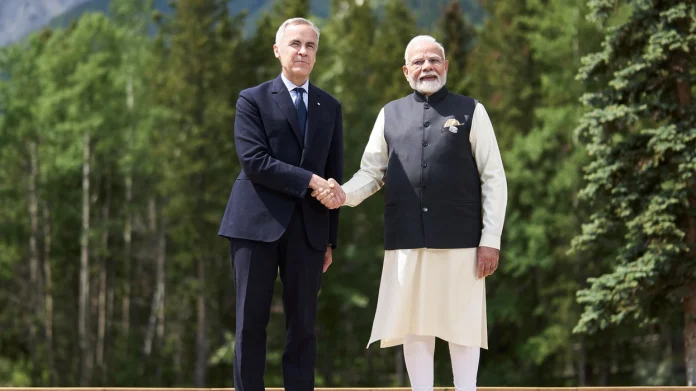India and Canada have agreed to restore full diplomatic relations, which were suspended nearly two years ago following a serious conflict, Indian media reported on Wednesday.
Under the agreement, the two countries have agreed to appoint new high commissioners in both capitals and resume regular consular and business services for citizens.
The origins of the diplomatic crisis
Tensions between New Delhi and Ottawa escalated in September 2023 after Canadian law enforcement agencies and a number of politicians accused Indian agents of involvement in the murder of Sikh activist Hardeep Singh Nijjar in British Columbia. India categorically rejected the allegations, calling them “absurd and motivated.” In response, both countries expelled diplomats: Canada expelled six Indian diplomats, and India expelled six Canadian diplomats.
Diplomatic breakthrough at the G7 summit
The breakthrough came on the sidelines of the G7 summit held on June 16-17 in Kananaskis, Alberta, where Indian Prime Minister Narendra Modi met with Canadian Prime Minister Mark Carney for the first time since 2015.
During the meeting, the leaders agreed to appoint new high commissioners and restore regular services for citizens and businesses. Narendra Modi described the dialogue as an “excellent meeting” and noted the unity in commitment to democracy, freedom and the rule of law. Mark Carney expressed satisfaction that the countries share priorities in energy security, artificial intelligence and countering transnational repression and terrorism.
After the talks, the countries confirmed their agreement to send ambassadors – high commissioners – to both capitals “in the near future.” Indian Foreign Secretary Vikram Misri described this as the first “calibrated step” towards restoring stable and mutually beneficial relations.
Resetting relations
The heads of government agreed to resume high-level and working-level channels in key areas: trade, people-to-people contacts, infrastructure and transport connectivity.
According to Modi, the prospects for co-operation in clean energy, digital infrastructure, food security, critical minerals and energy sector transformation were discussed.
The Canadian government reported that Carney emphasised India’s importance as a strategic partner in global supply chains and confirmed his readiness to resume dialogue on the trade agreement suspended in 2023.
Public reaction
Among the Indian diaspora in Canada, and especially the Sikh community, the reaction was mixed.
Protests took place in Calgary, with participants waving Indian flags and expressing their dissatisfaction with Modi’s invitation to the G7 summit. Carney called the invitation a bold but justified step, given India’s strategic importance for the energy transition and technological initiatives.
Intellectual co-operation
Discussions on issues related to transnational crime, repression and intelligence sharing continued in parallel with diplomatic negotiations. Canadian and Indian authorities agreed to resume co-operation in the areas of investigation, counter-terrorism and organised crime.
Economic prospects
The resumption of diplomatic relations creates favourable conditions for co-operation in various areas: Canada is one of India’s leading exporters of agricultural products, including lentils. The meeting opens up opportunities for trade in critical minerals and for attracting foreign and Canadian investment in Indian technology.
Both sides emphasised that this step is not a final resolution of all differences. Prime Minister Modi noted that the dialogue will continue and “gain momentum.” Ambassadors are to be appointed in the coming weeks, followed by consultations at the ministerial and agency levels.
Experts note that the change of Canadian prime minister from Justin Trudeau to Carney played a key role. Under Carney, there has been a shift in priorities: the strategy has become more focused on pragmatic co-operation with India rather than further investigations into cases of transnational repression.
The countries have taken an important step towards each other, launching a gradual restoration of strategic and economic ties while maintaining a focus on security, the rule of law and democracy.
